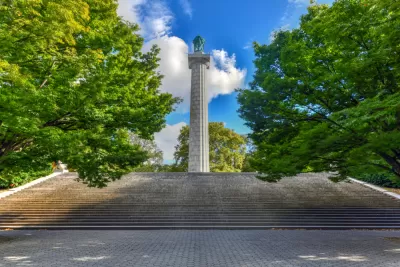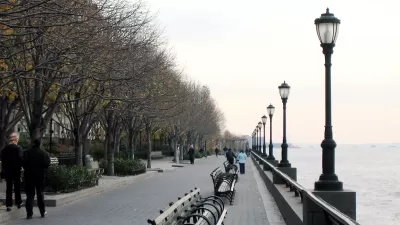The Parks Without Borders program in New York City is intended to open parks to the rest of the public realm, but some local activists like their parks just how they are.

Design changes proposed for Fort Greene Park in Brooklyn are creating controversy for the New York City Parks Department's "Parks Without Borders" program, according to an article by Kendra Hurley.
Parks Commissioner Mitchell Silver told Planetizen in an interview published earlier this year that the Parks Without Borders program is "removing fences, opening up sight-lines, breaking down walls, and converting sidewalks and streets next to parks into plazas."
The changes proposed for Fort Greene Park under the auspices of the program are too radical for a local organization called Friends of Fort Greene Park. Their complaint: that "the bulk of the redesign dishonors the historic vision of the park’s creators, Frederick Law Olmstead and Calvert Vaux, as well as the wishes of those who use this part of the park most, and especially the residents living in the housing developments across the street."
Rachel Sugar reported similar controversy with the same park and the same program in 2017, but Hurley suggests that the controversy with the Parks Without Borders program is not isolated to Fort Greene Park. "In a handful of other neighborhoods slated to receive the Parks Without Borders treatment, the program has been rife with controversy, inspiring some community members to rally in protest of proposed plans, but sometimes finding they have little recourse to stop them," according to Hurley.
The article includes a lot more context, in the form of anecdotes from activists in neighborhoods where the Parks Without Borders program has attempted parks redesigns.
FULL STORY: NYC ‘Parks Without Borders’ program draws controversy

Maui's Vacation Rental Debate Turns Ugly
Verbal attacks, misinformation campaigns and fistfights plague a high-stakes debate to convert thousands of vacation rentals into long-term housing.

Planetizen Federal Action Tracker
A weekly monitor of how Trump’s orders and actions are impacting planners and planning in America.

In Urban Planning, AI Prompting Could be the New Design Thinking
Creativity has long been key to great urban design. What if we see AI as our new creative partner?

King County Supportive Housing Program Offers Hope for Unhoused Residents
The county is taking a ‘Housing First’ approach that prioritizes getting people into housing, then offering wraparound supportive services.

Researchers Use AI to Get Clearer Picture of US Housing
Analysts are using artificial intelligence to supercharge their research by allowing them to comb through data faster. Though these AI tools can be error prone, they save time and housing researchers are optimistic about the future.

Making Shared Micromobility More Inclusive
Cities and shared mobility system operators can do more to include people with disabilities in planning and operations, per a new report.
Urban Design for Planners 1: Software Tools
This six-course series explores essential urban design concepts using open source software and equips planners with the tools they need to participate fully in the urban design process.
Planning for Universal Design
Learn the tools for implementing Universal Design in planning regulations.
planning NEXT
Appalachian Highlands Housing Partners
Mpact (founded as Rail~Volution)
City of Camden Redevelopment Agency
City of Astoria
City of Portland
City of Laramie




























